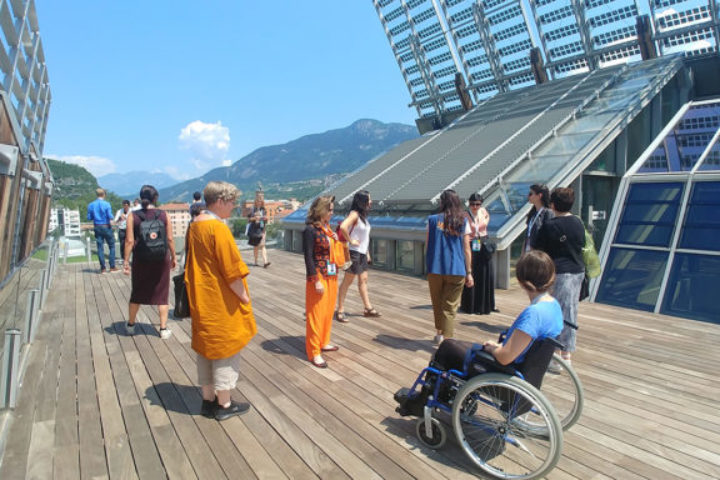In continuation of the publication of the ICOM-OECD Guide Culture and Local Development: Maximizing the Impact at the OECD Conference held in Venice in December 2018, ICOM shared its expertise during different international conferences and seminars related to local development and sustainability issues to promote the Guide and to ensure museums remain high on local decision and policy-makers’ agenda.
ICOM was invited to present the ICOM-OECD Guide during the 3rd UNESCO International Conference ‘Global Network of Water Museums’, which took place in Valencia, Spain, from the 12th to the 15th of June 2019. This conference, hosted by the University of Valencia, gathered museum professionals and academics from all continents, with the aim to explore the role of water museums and water cultural heritage for local development. One of the workshops also focused more particularly on education and the UN Sustainable Development Goals, in relation to water management.
ICOM’s keynote speech was delivered by Marie Claverie, Coordinator of the “Museums and Society” section, which was recently created within ICOM’s Secretariat. In addition to recalling the content and objective of the Guide, she presented how the cooperation between ICOM and the OECD fits within ICOM’s global strategy in relation to sustainability issues and the adaption of the museum community to the challenges of the 21st Century. She also gave examples of the policies’ and actions’ implementation listed in the Guide for water museums. Researchers of the EU-LAC-MUSEUMS project actively contributed to the exchanges as well: Luis Repetto (Museum of Arts and Popular Traditions of Pontificia Universidad Católica, Peru) talked about traditional water management and flood risk management in Peru, while Jorge Hermosilla and his team (University of Valencia, Spain) presented their research on water heritage in the Valencian region.
On 18 June 2019, Afşin Altaylı, coordinator at ICOM’s “Museums and Society” section, made a presentation untitled “Seeking change: Museums, societal trends and challenges” at the Summer Academy on Cultural and Creative Industries and Local Development (SACCI) organized by the OECD in Trento, Italy. This annual seminar helps policy-makers, representatives of cultural and creative industries and civil society organisations to develop expertise on integrated strategies and policy frameworks to unveil the full potential of culture as a driver for local development.
Organised around three main dilemmas (Linear development vs Holistic approach, Tradition vs Innovation and Preservation vs (re)Activation), the 2019 edition of the Summer Academy brought together participants representing local, regional or national governments from different regions and 19 countries, including Chile, Italy, Portugal and Morocco. In his presentation, Afşin explored alternative strategies for mapping, tracing and interpreting the current societal trends and challenges museums are facing in order to reflect them on the core values shared by the international museum and heritage community. He discussed how societal, epistemological, environmental and political changes impact the way museums formulate their definitions, rethink their roles in contemporary society and assume new responsibilities in order to remain relevant. Michele Lanzinger, Director of MUSE; Lia Ghilardi, SACCI Facilitator; Alessandra Proto, Director, Trento Centre for Local Development and Fabio Viola, Founder of TuoMuseo were among the speakers of this second day of the Summer Academy with a specific focus on museums.
These two events are part of a series of meetings and activities in which ICOM Secretariat was represented within the framework of the cooperation between ICOM and the OECD, following the seminar summarising the Polish edition of “Culture and Local Development, Maximizing the impact: Towards the OECD and ICOM guide for local governments, communities and museums” research project organised on 10 April 2019 at the Museum of King Jan III’s Palace, Wilanów, Poland. The Wilanów meeting welcomed a series of high level speakers such as Małgorzata Jarosińska-Jedynak, Undersecretary of State in the Ministry of Investment and Economic Development; Paweł Jaskanis, Director of Museum of King Jan III’s Palace at Wilanów; Prof. Dorota Folga-Januszewska, Deputy Director of Museum of King Jan III’s Palace at Wilanów / ICOM-SAREC; Paulina Florjanowicz, Director of The Department of Cultural Heritage, The Ministry of Culture and National Heritage; Ekaterina Travkina, Coordinator, Culture, Creative Industries and Local Development, OECD; Prof. Monika Murzyn-Kupisz while ICOM was represented by Afşin Altayli.
These activities intend to support and inspire museums, representatives of cultural and creative industries and civil society organisations and local governments to strengthen their collaboration with the objective to increase their impact on local development.
